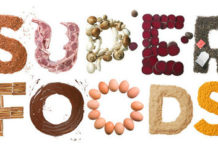Superfood is a marketing term used to describe foods with supposed health benefits. The superfood term is not in common use by dietitians and nutrition scientists, many of whom dispute that particular foods have the health benefits often claimed by advocates of particular superfoods. The Macmillan Dictionary defines ‘superfood’ as a food that is considered to be very good for your health and that may even help some medical conditions. The Oxford Dictionary definition states a superfood is “a nutrient-rich food considered to be especially beneficial for health and “well-being”. The group Cancer Research UK says, “the term ‘superfood’ is really just a marketing tool, with little scientific basis to it”. Another source defines superfood as “a non-medical term popularised in the media to refer to foods that can have health-promoting properties such as reducing one’s risk of disease or improving any aspect of physical or emotional health. So-called superfoods may have an unusually high content of antioxidants, vitamins or other nutrients.”Superfoods are a quick and easy way to get some serious nutrients into your body. Yet stepping into the world of superfoods can be a little intimidating.In short, superfoods are great for your body and great for our world. They are all natural and are filled with many nutrients that our bodies crave but don’t receive. And because they are non-GMO + organic that means they are coming from hard working farmers who take care of their crops and the earth in sustainable ways.
In 2007, the superfoods category was forecast to become a billion dollar global industry by 2011,with several thousand new superfruit products expected to enter the marketplace. According to Datamonitor, superfruit product launches grew at a rate of 67% over 2007-8, but underwent significant category erosion beginning in 2011 when introductions of food and non-food products featuring pomegranate, açaí or goji declined by 56% for the period from 2011-12 versus 2009-10.This is superfood, 2.0, the age of miracle powders. Ingredients judged to be the most nutrient-dense on the planet, freeze dried and fine milled, are being marketed to us as magic bullets, full of enzymes, antioxidants, vitamins and minerals, and supposedly delivering all kinds of marvellous health benefits, from balancing hormone and blood sugar levels to aiding and preventing chronic conditions such as diabetes, cancer and dementia.
Powders are suddenly the height of chic. Health-nuts Instagram their morning juices and smoothies, in shades of green from pond scum to sun-bleached grass, and smugly list the superfood powders contained therein as if reeling off a list of fashion labels. The rule of thumb appears to be the more exotic and unpronounceable the ingredient, the better.In America a powder called Soylent is billed as an alternative to three meals a day.protein powders, sourced from soy, whey, pea, rice and hemp. The very idea of them reminds me of those health shops that sell huge tubs of the stuff with their terrifying photographs of mahogany-tanned, vein-popping body-builders. While protein powder’s current marketing is altogether softer, and directed at a different customer, the benefits remain the same: weight loss, muscle recovery, immune-system boosting. Now whey-protein smoothies are sold at the smart boutique exercise class Barry’s Bootcamp for post-session muscle recovery. Rosie Huntington-Whiteley and Lara Stone (neither of whom are known for their bulging biceps) reportedly regenerate their gym-bunny bodies with James Duigan’s Body Brilliance protein powder. The case for protein is compelling. Harvard cites a 20-year study of more than 80,000 women who followed a low-carbohydrate diet high in vegetable sources of fat and healthy protein. The women experienced a 30 per cent lower risk of heart disease compared with those who ate a low-fat, high-carb diet.
This is a strange place to find ourselves. Food is about ritual, religion, emotion, history, not just nutrition. It’s what we eat but also how we eat, why we eat and where we eat. Thinking of food in terms of isolated ingredients can miss the point of it. As the author Michael Pollen writes, a shared meal “elevates eating from a mechanical process of fuelling the body to a ritual of family and community, from the mere animal biology to an act of culture”. It is natural to want to do the best for ourselves. Who doesn’t want to live a longer, healthier life? By all means try a super-greens powder, add some maca to your morning porridge, go crazy with your Vitamix. There are empirical benefits to these substances.
The top ten Superfoods that should be taken by all as per research are as follows:
• Chia Seeds
• Coconut Oil
• Flax Seeds
• Goji Berries
• Spirulina
• Cacao Powder and Nibs
• Avocado
• Hemp Protein
• Camu Powder
• Acai
The top ten Supplements have been listed herein below:
• Optimum Nutrition Essential AmiN.O. Energy
• Optimum Nutrition Gold Standard 100% Whey
• JYM Pre JYM
• JYM Pro JYM
• EVLUTION NUTRITION LeanMode
• Cellucor C4
• BSN Syntha-6
• EVLUTION NUTRITION ENGN
• JYM Post JYM Active Matrix
• MusclePharm Combat Crunch Bars






















![Android Emulator not working in AMD RYZON 7 – 3700 [Hyper V] – ERROR SOLVED!!! android emulator not working in AMD Processor](https://gdhaduk.com/wp-content/uploads/2020/06/android-emulator-not-working-in-AMD-Processor-100x70.jpg)

